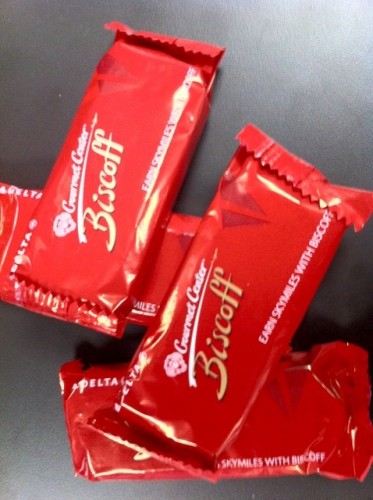
Complimentar Biscoff cookies on Delta Air Lines, courtesy Susan Chana Elliott
My column this week on msnbc.com – Free meals on planes fly into the sunset – is all about the demise of “free” meals for economy class passengers on domestic airlines. It’s also about the efforts airlines are making to convince travelers to buy their meals on board.
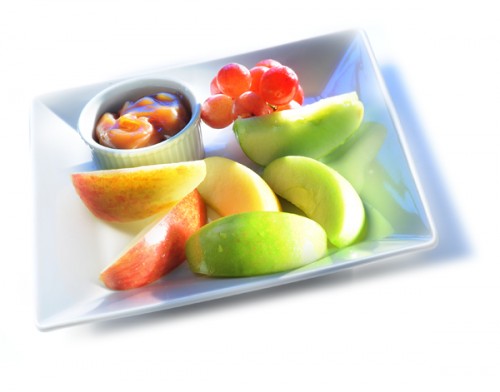
Delta Air Line fruit plate
Working on the story was especially fun, because there’s not only a reader survey accompanying the story, but a slide show of airline snacks and meals and a photo gallery of airplane meals sent in by readers.
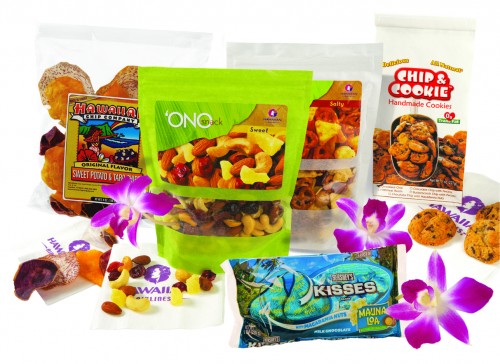
Here’s the story:
On a Continental Airlines flight this summer from Newark to Seattle, one of my seatmates made a wisecrack about the “mystery meat” in the complimentary in-flight meal. “Say what you want,” snapped the flight attendant, “Continental is the last airline serving free meals and soon they’re going bye-bye. I bet you’ll complain then too.”
She was right about the complimentary meals.
Today Continental Airlines, which recently merged with United, begins selling buy-on-board meals on all domestic flights less than six hours. Hawaiian Airlines continues to offer its passengers complimentary meals, plus a premium option for purchase (bestsellers: sushi and cheeseburgers), but Continental is the last major domestic airline to jettison free meals.
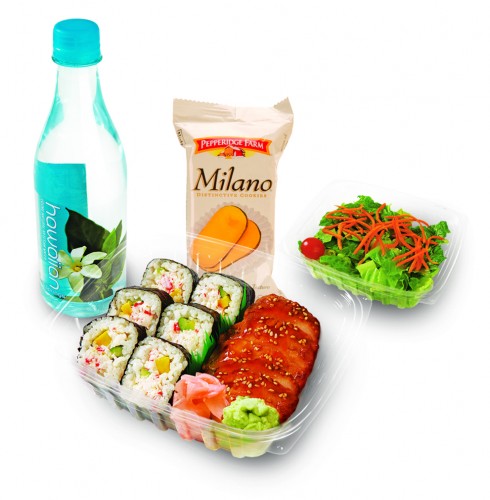
Hawaiian Airlines sushi
“What Continental served to coach passengers wasn’t exactly a four course meal. It was more like a roll with a piece of meat,” said aviation expert Mike Boyd of Boyd Group International. “I won’t miss it. But now that the free meals are gone, I’m sure some people will complain.”
Continental’s chief marketing officer, Jim Compton, terms the move away from free-food a reflection of “today’s market and customer preference.” But cutting out complimentary meals will save Continental an estimated $35 million a year. Not that much dough when an airline’s success is measured in billions of dollars, but still significant in an era when every penny counts.
Do meals matter?
Beyond marking a mile-high-meal milestone, will anyone really care that Continental has cut its complimentary meal service? “I doubt it,” says Mary Tabacchi, an associate professor of food and beverage management at the Cornell University School of Hotel Administration. “Economy class passengers voted with their feet a long time ago. Schedules and cost now come first and food is way down in the rankings. Meals on Continental were just a bonus.”
For now, most airlines continue to offer complimentary coffee, tea, water and soft drinks. Some continue to serve snacks.
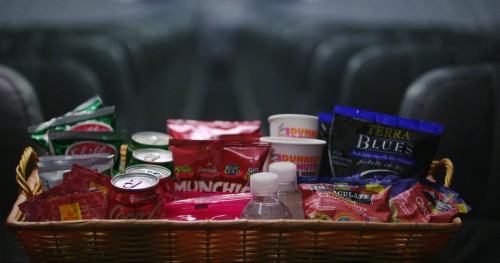
Free snacks on JetBlue
Continental’s Mary Clark says “Our complimentary snacks are still offered with beverage cart service on most flights; cookies in the morning and pretzels for the rest of the day/evening.” Southwest Airlines passengers can snack on peanuts or pretzels on all flights.
Complimentary snacks on AirTran and United include small bags of pretzels or Biscoff cookies. Delta Airlines adds peanuts into that mix.
Midwest Airlines became famous for its complimentary, warm chocolate chip cookies and, now that the airline has merged with Frontier, the cookie tradition continues.
Alaska Airlines hands outs a complimentary snack mix and, on some longer flights, Cougar Mountain cookies. Alaska passengers going to Hawaii are also treated to a small serving of Mauna Loa Macadamia nuts and a complimentary Mai Tai or passion orange guava juice.
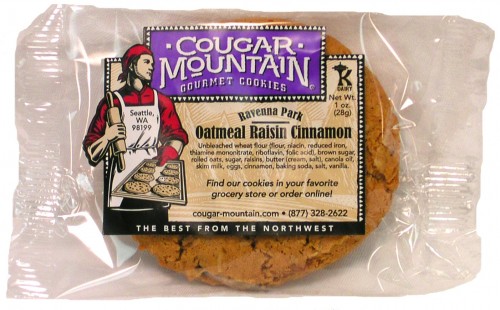
JetBlue offers passengers unlimited servings of chips, cashews, animal crackers and other items. And each month regional Horizon Air offers passengers a different Northwest wine and microbrew at no extra charge.
Beyond snacks
The list of fresh meals offered on US Airways changes six times a year. The airline’s Valerie Wunder says the airline uses Twitter votes and in-flight testing to see which buy-on-board meals and snacks are passenger favorites. “That’s how we decided to drop instant oatmeal and instant soup but keep the popular Pringles and Blue Diamond almonds.”
During October, to celebrate its 3rd year of flying to Hawaii, Alaska Airlines is selling Hawaiian-themed meals, such as the Hawaiian Breakfast Skillet, on all flights 2.5 hours or longer. Alaska’s Marianne Lindsay says the airline’s food and beverage team works year-round with a design chef from LSG Sky Chef, one of three major in-flight catering companies, to create meals that feature many regional food items. “We also post the chef’s email address in our inflight magazine,” she said.
Spirit Airlines lists its food for purchase in its on-board magazine, not online as most other airlines do. The airline sells soft drinks ($3), animal crackers, instant soup and other snack items ($2-$4) and offers mix-and-match value meals for $3 to $14 dollars. For example, a single beer or wine is $6, but if you buy three drinks at once, the package price is $14.
On Virgin America, which rolled out its new menu on October 1st, passengers use their seat-back touchscreens to order (and pay for) a meal or a snack anytime during a flight. Suggested food and drink pairings are offered at a discount before each order is completed. “We do pretty well because the menu system allows people to browse,” say Virgin America spokesperson Abby Lunardini. “We know on average people are willing to spend $21 on ancillary items such as movies, premium TV, Wi-Fi, food and cocktails. And we’re hitting that target.”
Competition on the ground for meals in the air
As they did with baggage fees and fees for extra legroom, aisle seats and other unbundled airline amenities, passengers are getting used to the idea of buying their own in-flight meals.
But that doesn’t mean they’re buying those meals on airplanes.
In Zagat’s 2009 airlines survey, 19% of travelers said they’d willingly pay for snacks on domestic flights. Only 6 percent of those surveyed said if a free meal isn’t offered they typically purchase buy-on-board meals.
Are travelers filling up on Pringles or going hungry instead? 7% said they were, but 56% of those Zagat surveyed said they bought their in-flight meals at the airport.
All those brought-on-board meals are pushing those who prepare buy-on-board menus to work harder. “We are absolutely competing with airport food,” said Rob Gallagher, Virgin America’s catering manager, “Airports are now doing so many wonderful things with food.”
Hans Miller, CEO of Airside Mobile, agrees. “The average passenger spends more than $8 on food per trip at the major airports. Airlines and airports are just beginning to see themselves in competition for those food sales as well as other service-oriented revenue.”
“That competition means passengers are getting better in-flight snack and meal choices,” said Bill Gillen, an executive chef for LSG Sky Chefs, which creates menu items for American, Alaska, US Airways and Virgin America. “In the past it was just putting things together. Now there’s a lot more thought going into offering things that are interesting, innovative and a good value. Like the shaved roast turkey sandwich with corn bread stuffing some airlines will be offering during the holidays. People love that!”
What else will travelers love? United Airlines is hoping passengers will love ordering, and paying for, their in-flight meals before they even get on the plane.
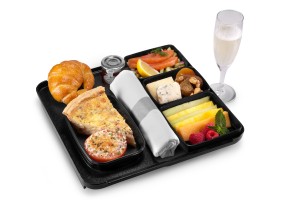
You can now pre-order brunch on some United Airlines transcontinental flights
Last week the airline introduced two $24.99 brunch options, with chocolate and sparkling wine, for customers flying transcontinental p.s. (premium service) flights between New York’s Kennedy airport and Los Angeles or San Francisco.
The twist: meals must be ordered on-line, 72 hours before a flight.
Will $25 premium pre-purchased meals be the next big thing in flying? Henry Harteveldt, an airline and travel analyst for Forrester Research doesn’t think so. “I believe a premium meal offering would have consumer appeal. But I am concerned that, even with sparkling wine, this is too expensive.”